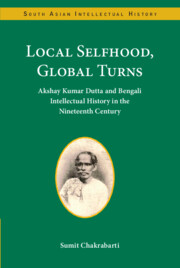 Local Selfhood, Global Turns
Local Selfhood, Global Turns Book contents
- Frontmatter
- Dedication
- Contents
- Acknowledgements
- Note on Transliteration
- Introduction
- 1 The Discontents of Eclecticism: The Milieu of Akshay Kumar Dutta
- 2 The New World of Science: Akshay Kumar Dutta as the ‘Science Worker’
- 3 The Tattwabodhini Period: The Conflicting Contours of Self-Fashioning or Towards a Global History?
- 4 Reconstructing Bengali Selfhood: The Conception of Dharma in Akshay and Bankim
- 5 On the Question of the Public Sphere: Civic Life, Polity, Dissent, and an Affective Engagement with the Janasamaj
- 6 Imagining Bharatvarsha: Identity, History, Nationhood
- Conclusion and Further Thoughts
- Bibliography
- Index
6 - Imagining Bharatvarsha: Identity, History, Nationhood
Published online by Cambridge University Press: 30 June 2023
- Frontmatter
- Dedication
- Contents
- Acknowledgements
- Note on Transliteration
- Introduction
- 1 The Discontents of Eclecticism: The Milieu of Akshay Kumar Dutta
- 2 The New World of Science: Akshay Kumar Dutta as the ‘Science Worker’
- 3 The Tattwabodhini Period: The Conflicting Contours of Self-Fashioning or Towards a Global History?
- 4 Reconstructing Bengali Selfhood: The Conception of Dharma in Akshay and Bankim
- 5 On the Question of the Public Sphere: Civic Life, Polity, Dissent, and an Affective Engagement with the Janasamaj
- 6 Imagining Bharatvarsha: Identity, History, Nationhood
- Conclusion and Further Thoughts
- Bibliography
- Index
Summary
Partha Chatterjee ends his short piece Our Modernity with a few specific remarks on how the nature or fashioning of post-colonial modernity in India would necessarily be different from the larger and more general template of modernity that has emerged from continental Europe. In the first place, the native subject is always a consumer and not the producer of modernity. It is inevitable, therefore, that to ascertain one's subjecthood within the narrative of history the post-colonial subject must look backwards into an independent and creative past. Chatterjee asserts that it is ‘superfluous to call this an imagined past, because pasts are always imagined’. I shall come back to this point about the relationship between imagination and the past in greater detail later in the chapter. Second, unlike the model of prioritizing the present over the past that Kant delineates in ‘What Is Enlightenment?’ as the model for the progress of western modernity, Chatterjee notices how the post-colonial model of modernity in India is predicated on an escape from the present to the past. Chatterjee considers Rajnarayan Basu's Sekal ar Ekal to be a formative text in this regard. He concludes, therefore, that ‘the very modality of our coping with modernity [is] radically different from the historically evolved modes of Western modernity’. Third, it is also an imperative, according to Chatterjee, that in fashioning post-colonial modes of modernity the subject needed to ‘reject the modernities established by others’. Chatterjee argues that from the position of the colonized subject it was rarely possible to imagine or believe in a template of universal modernity, a ‘domain of free discourse, unfettered by differences of race or nationality’. In spite of these differences with the general or universal template of modernity that Chatterjee points out here, the narrative of Indian modernity has traced a fraught and complicated path that may not have been as ‘radically different’ as he claims in the essay.
Viswa Patir Viswa-Rachana
One of the principal questions in terms of social polity that was foremost in the mind of the nineteenth-century Bengali intellectual was undoubtedly that of modernity. Whether to accept the template of modernity foisted on the native by the colonizer or to reframe the idea of modernity through indigenous links to a glorious past (along with its obvious orientalist implications) were questions that could not be easily answered.
- Type
- Chapter
- Information
- Local Selfhood, Global TurnsAkshay Kumar Dutta and Bengali Intellectual History in the Nineteenth Century, pp. 192 - 222Publisher: Cambridge University PressPrint publication year: 2024
